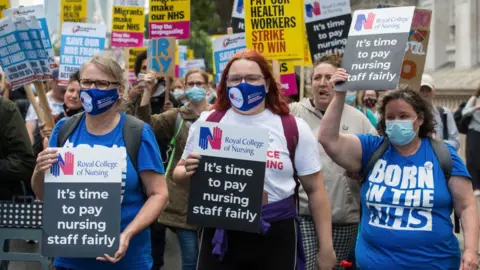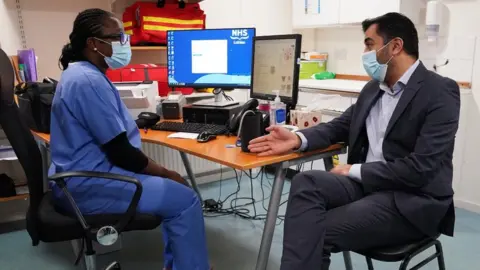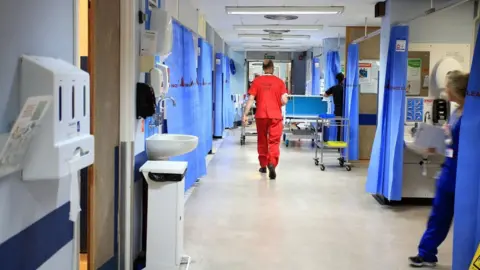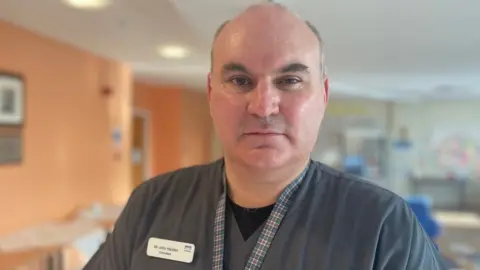Nurses in Scotland vote for strike action in pay dispute
 Getty Images
Getty ImagesScotland's largest nursing union has voted to go on strike for the first time ever in a dispute over pay.
Members of the Royal College of Nursing (RCN) have rejected the Scottish government's revised pay offer.
The union said every service in Scotland had supported industrial action, and called on ministers to return to the negotiating table.
The government said there was no more money for public sector pay rises and that a strike would be "catastrophic".
Action is expected to start by the end of the year after RCN members across the UK voted to strike.
The most recent Scottish government pay offer was for a flat rate of £2,205 per person, backdated to April.
The union has described the deal as a real-terms pay cut and accused the government of not listening to staff concerns. It asked for at least 5% above inflation, which rose to 10.1% in September.
The RCN's Scotland director, Colin Poolman, said turnout had reached 70% in some of the organisations which had been balloted, and that more than 90% of members had voting in favour of strike action in most areas.
He said "life-preserving services" would still be in place despite the industrial action.
 PA Media
PA MediaMr Poolman said he hoped the Scottish government would return to negotiations with an improved offer.
"If we don't do something now, the nursing crisis is only going to get worse and have a direct impact on patient care," he said.
"This is not just about nursing pay, this is about supporting patients and ensuring that we have a sustainable workforce going forward."
Last month, members staged a protest outside the Scottish Parliament after the union confirmed it was balloting all 300,000 UK members for the first time in its 106-year history.
Last week about 2,500 workers in the Unite union voted for industrial action.
Members of the GMB union and the Chartered Society of Physiotherapy have also backed strike action.
But Unison, Scotland's largest health union, has suspended its strike ballot of NHS staff and is consulting its members on a revised pay offer until 14 November.


When you talk to nurses who have been juggling shifts for 20 years or who moved out of their homes during the pandemic, there is a real sense of exhaustion and low morale.
Again and again staff talk about earning more in a supermarket or an office where there are more regular hours and less demands.
It's perhaps no surprise then that there has been such support for strike action in every part of Scotland, with the RCN saying the future of the profession is at risk without better rewards.
Other unions that represent staff like paramedics, midwives or physiotherapists also stand ready to strike. However, the biggest healthcare union, Unison - which represents domestic staff through to senior nurses - has pulled its strike ballot, preferring to let members decide whether to accept the government's pay offer.
There is still time for negotiations to continue, but in the meantime discussions will take place between unions and health boards to work out which services are critical to patient safety.
It means some staff who may have voted in favour of industrial action but who work in A&E or intensive care will still be asked to cover shifts.

The latest pay offer in Scotland would mean an average salary increase of 7%, with the lowest paid gaining more than 11% and qualified nursing staff receiving up to 8.45%.
Health Secretary Humza Yousaf described the offer as "the largest of its kind since devolution".
He said he was disappointed with the decision to strike but respected the RCN's mandate.
Mr Yousaf said the health service was already under significant pressures, which were likely to increase over the winter.
"So of course a strike would be catastrophic, I don't think anyone can say otherwise," he said.
 PA Media
PA MediaMr Yousaf said he hoped to continue dialogue with the unions to avert industrial action.
"Nobody wants a strike to take place in a health service that is already extremely stretched and in the midst of winter," he added.
He added that the UK government should "put its hand in its pocket" to provide more funding for such pay deals, saying: "I don't have any more money."
Unions have called for an enhanced deal that reflects the pressures facing households due to the cost of living crisis, which has been caused by rising energy bills and soaring food prices.
In England and Wales, NHS staff, including nurses, have been offered an average of 4.75% more, with extra for the lowest paid.
Meanwhile, in Northern Ireland, nurses are yet to receive a pay award.

'We're close to the tipping point'

Dr John Harden, the Scottish government's deputy national clinical director, is a consultant in emergency medicine at Wishaw General Hospital.
He said NHS Lanarkshire had shifted to "code black", where the focus on patient safety and prioritising treating the sickest patients.
He said staff were struggling to find space for new patients arriving in the emergency department.
He said the hospital was "pretty close" to the tipping point, and that some colleagues had reached their limit with the working conditions in the hospital.
"I think unfortunately some people might find it too much. I know some colleagues who have and I'm not surprised," he said.
"The reason they do end up in that situation is because they care and they find it very difficult to manage the balance of their caring and compassion being stretched to the limit."
